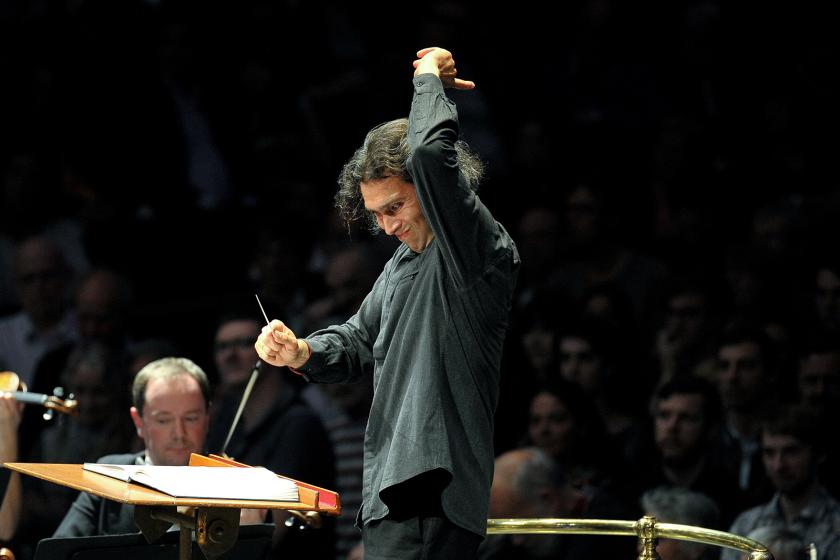Nothing will ever test the depth, breadth and sheer virtuosity of a large orchestra more than Mahler’s symphonies. It’s hardly surprising, then, that the two unsurpassable concert experiences, for me, have been Bernstein’s Mahler Five at the Proms and Abbado’s Lucerne Festival Ninth, or that the two London orchestras with the most consistently challenging conductors, the LPO under Vladimir Jurowski and the BBC Symphony Orchestra with Sakari Oramo, have chosen to open their new seasons with the two most experimental of the 10 symphonies on consecutive nights.
And “night” is the key word for the Seventh, the crowning Symphonie fantastique in a series never short of focused grotesqueries: four fifths nocturnal, with a baffling but exhilarating daylight blaze at the end, the luminous world of Tristan und Isolde’s second act, but starless and populated by Boschian creatures, followed by the Mastersingers on steroids surrounded by the people careering around the Nuremberg meadows. Maybe there’s even a hint of that opera’s serenaders in the transitional Andante amoroso, one of Mahler’s most fascinating and ambiguous movements. It was a foregone conclusion that Jurowski, about halfway through his one-a-year Mahler series with the LPO, would have prepared every spectral and exposed detail to perfection, but would he let his men, women and beasts off the leash?
The dying fall of the coda, the fading of the dream, over which Jurowski again took his time has never sounded more magicalAfter his own fashion, absolutely. The ultimate climaxes of the bulging outer movements were never in doubt, and approached by steady degrees of intensity. The opening night processional moved from the most full-toned of tenor horns (for which read euphonium, balefully lowing in the hands of David Whitehouse) and masterful trombones to a prize carnival float of unprecedented width – not in the score, but it worked – cheerled by no less than three tambourines (I’m guessing that Jurowski took what I presume was unprecedented licence from the example of Berlioz’s two). In the rare moments of lyric respite, cellist Kristina Blaumane - a leader in her own right among the strings - rose up to meet the violin melody with superbly supportive and mobile arpeggios.
The Festival Hall was never going to be the place for distant perspectives in dark landscapes – funny how works like this sometimes even make one nostalgic for Albert’s impossible Coliseum – so Jurowski kept the horn calls of the first Nachtmusik so sonorously led by David Pyatt focused and very present, march rhythms crisp but deliciously delayed by the wood-on-bow second violins and cowbells clattering from halfway up the hall (“It was all so grand, and then it turned into Heidi,” I heard a lady behind me crossing the bridge afterwards exclaim, missing the point of Mahler’s Alpine night poetry).
At the dead centre of the symphony, the ghosts’ waltzing high noon, every lurid glissandoing groan, shock slap and woodwind wail made its mark; not even among the many recordings – and I listened to all that were available some years back for BBC Radio 3’s Building a Library – could so much perceptive detail, as well as imperceptible rubato, be found. I’d have put the occasionally recalcitrant mandolinist and guitarist for the moonlit serenade right in the centre of the strings rather than out on a limb, but the dying fall of the coda, the fading of the dream, over which Jurowski again took his time has never sounded more magical.
The trumpets were careful not to risk blasting out their top Cs too prematurely in the finale – it’s a long journey to the ultimate reconciliation of the night tune with the daylight revelers – and our master of ceremonies’ control over every dancing element, however sensuous or lumpish, was absolute. No microphones were present, which means this won’t be a candidate for the LPO Live label; maybe the ever-questing Jurowski just wants to give it a bit more time, but it sounded fairly perfect as it was.
- Jurowski's next LPO concert is on Saturday 26 September - Taneyev, Tchaikovsky and Sibelius













Add comment